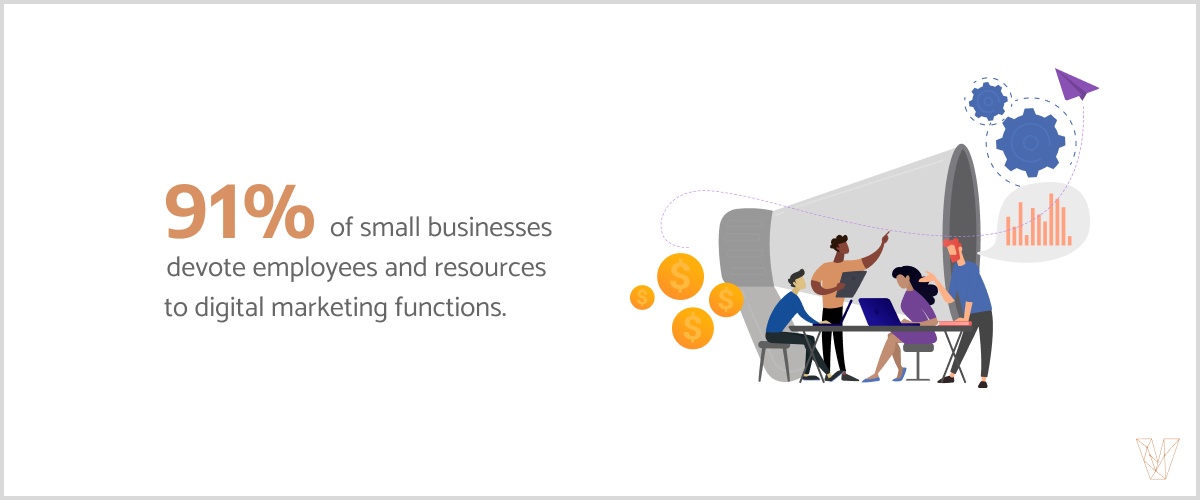According to Visual Objects’ 2021 and 2022 data, small businesses looking for digital marketing solutions will choose from a range of different channels and strategies. Companies should consider their business needs, budget, and what benefits specific digital marketing channels will provide when crafting future digital marketing plans.
Imagine you’re a salesperson. Your goal is to appeal to customers and effectively turn leads into sales.
Thirty years ago, you may have turned to cold calling or even door-to-door sales to attract new customers.
If you tried those tactics today, probably very few people would engage. The vast majority of purchasers, especially B2B buyers, say they won’t speak to a salesperson until they’ve done their own research.
Instead of answering your cold calls, buyers are researching your company’s digital presence. They’re scanning your website, social media presence, and probably some reviews from past clients. You can guide customers to your services through digital marketing.
Effective digital marketing strategies facilitate consumer research, establish brands, and drive conversions.
However, digital marketing trends and strategies are constantly changing. Visual Objects conducted two surveys – one in 2021 and the other in 2022 – of small business owners to find out which digital marketing solutions impact their goals and strategies.
2022 Small Business Digital Marketing Plans
- Social media is the top digital marketing tool – over two-thirds of small businesses (67%) are leveraging classic and emerging social media tools for their digital marketing strategies.
- In 2022, small businesses found that social media (25%), their own company website (20%), and online advertising (18%) were the most successful digital marketing tools.
- Despite its proven success, video marketing is still not a key component of digital marketing strategies – only 6% of small businesses believe it is successful at achieving their goals.
- Nearly half of small businesses (48%) still use email marketing, implying its continued value.
- Only 6% of small businesses find value in SEO and content marketing, citing the lack of immediate results.
2021 Small Business Digital Marketing Plans
- Almost all small businesses (91%) allocate resources to digital marketing functions, demonstrating the importance of digital marketing.
- A company website is the most popular (51%) digital marketing strategy among small businesses', making them an essential part of most small business marketing plans.
- 3 in 4 small businesses (73%) consider social media marketing to be one of their most successful digital marketing channels because of social media’s ability to boost brand awareness.
- One in five small businesses (19%) will be decreasing video marketing spending in 2021, which experts attribute to production expenses, remote coordination challenges, and in-house production alternatives.
- Two-thirds of small businesses (64%) that use email marketing execute without marketing or customer relationship management (CRM) software. Experts say that companies who don’t use a CRM fail to realize email marketing’s full value.
- Only 10% of small businesses will increase their spending on SEO in 2021, in part because of the algorithmic advantage given to larger brands.
Almost All Small Businesses Devote Resources to Digital Marketing
Whether managed through in-house employees, an outside agency, or a software system, digital marketing is a core process for small businesses.
In 2021, 9 in 10 small businesses (91%) allocated resources to digital marketing activities.
Digital marketing can have significant impacts on a company’s bottom line.
Omid Semino, Owner of Diamond Mansion, a jewelry store, is just one example of a small business owner who’s excited about the potential of digital marketing.
“Digital marketing holds a lot of power in modern times,” Semino said. “If you are going to invest anywhere, it is wise to put [funds] into digital marketing.”
With the impact of COVID-19, small businesses in 2021 and 2022 needed to find the right balance for their digital marketing goals. Small businesses are aligning themselves with consumer behavior by devoting resources to digital marketing activities.
The Most Popular Modern Marketing Channels Vary for Small Businesses
In 2021 and 2022, small businesses changed their beliefs on marketing channels as the digital landscape evolves.
Company Websites: 2021's Most Popular Marketing Channel
When customers research businesses, they look to an official website for accurate information on the company. This is why it's important to have a professional website with a great user experience, and web design company can help you.
In 2021, more than half of small businesses (51%) used a website as part of their digital marketing strategy.
-1.png)
Company websites are the most common digital marketing channel for small businesses.
An official company website is important to:
- Legitimize your business online
- Generate leads
- Develop a brand
Experts say it’s possible for small businesses to successfully market themselves without a website. However, marketing strategists such as Andrew Clark from digital marketing firm Duckpin believe company websites are essential for any business committed to digital marketing.
“People will instinctively want to look up your business and learn more about your business once they hear about it. That is where having a website would make your marketing efforts more effective,” Clark said. “[Regional businesses are] missing out on valuable local traffic from Google by not having a website.”
“[Regional businesses are] missing out on valuable local traffic from Google by not having a website.”
In 2021, company websites are the most widely-used digital marketing channel by small businesses and establish a foundation for a small business’s digital presence. But in 2022, we found that social media has become the most used digital marketing channel.
Social Media: 2022’s Most Popular Marketing Channel
More than two-thirds of small businesses (67%) currently use social media as a digital marketing channel.
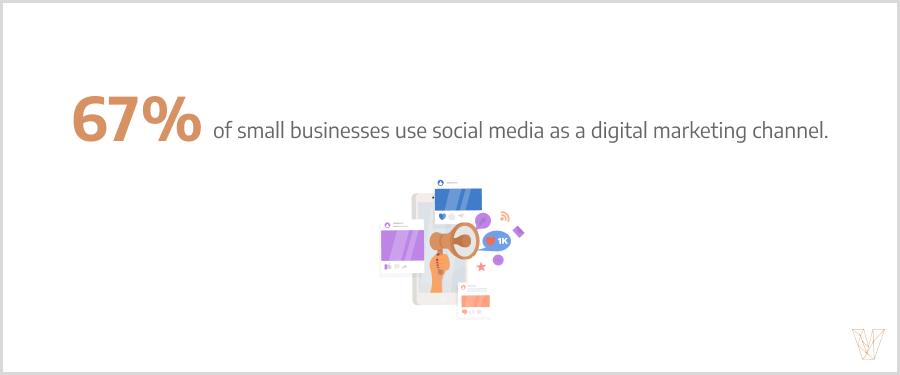
While a company website as a marketing tool is still relevant, the future of digital marketing is all about social media.
Reno Lovison, owner of Reno Lovison Marketing, believes that the openness and community of social media is the selling point.
“Social media platforms are where people generally meet to socialize and interact with one another. If you have something to sell, you want to be where the people are,” Lovison said. “Social media is the virtual equivalent of the street corner, shopping mall or marketplace in the analog world.”
"If you have something to sell, you want to be where the people are...."
With more companies reinvesting in social media tools, emerging channels like TikTok are becoming the next step in the future of digital marketing.
“The shiny new toy is always appealing and can be an opportunity for small businesses looking to make a big splash in a small pond,” said Lovison.
Regardless of what social media tools your business is using, it is clear that the future of digital marketing is found online.
Online Digital Marketing Channels Bring Small Businesses Most Success
While small businesses, depending on the industry, might gravitate to certain marketing channels, it is clear that the power is online.
In 2021, small businesses found that online tools like social media (25%), their own company website (20%), and advertising through channels like Google and Microsoft (18%) were the most successful at meeting their business objectives in the world of digital marketing.
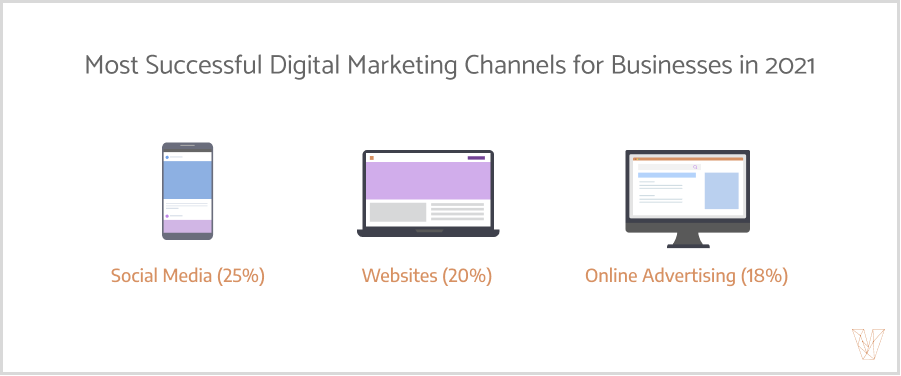
No matter the channel, small businesses can use them in different ways to meet their advantage.
Social Media Boosts Brand Awareness
Small businesses use social media to connect with customers and establish a strong brand identity.
Of small businesses who plan to use social media in 2021, 22% say their primary objective is to build brand awareness, which is larger than any other motivation.
A quarter of small businesses (25%) believe that social media met that objective when asked in 2022.
Small businesses may attribute success to social media because their goals for the channel are aligned with its purpose.
Stephanie Brown, social media consultant and coach at The Content Fixer, believes small businesses genuinely connect with customers over social media.
“Social media also allows for more authentic connection with your dream clients,” Brown said. “Other marketing channels may not allow you to establish a real know-like-trust relationship with the people you're trying to reach.”
“Social media also allows for more authentic connection with your dream clients.”
Companies aiming to increase brand awareness find success by marketing through social media.
Company Websites Bring Recognition
For small businesses, their company website is their main selling point. In fact, 20% of small businesses believe that its their second most successful digital marketing tool after social media.
After all, a company website should include all of the product offerings, information, and other features that draw consumers in.
Jeremy Haug, owner of B2B Business Experts, a digital marketing agency, believes in the importance of website engagement.
“Your website is your online storefront so seeing how people are or aren’t engaging on your page can make a huge impact on the bottom line for a business,” said Haug.
It is important for small businesses to focus on their website as a key elememt of their SMB marketing plans.
Online Advertising Generates Buzz
Without advertising, your business is limited to your current audience. As online advertising through social media, native, and PPC grow in popularity, the use of it has increased as well.
Nearly 20% of small businesses (18%) found that online advertising was the third most successful digital marketing tool that achieved their goals in 2021.
Online advertising includes several forms:
- Native Advertising
- Search Engine Marketing (SEM)
- Display Advertising
- Mobile Advertising
- Social Advertising
- PPC
These types of advertising are easy to integrate within an overall digital marketing strategy.
With more and more people sending time online, having a presence in the digital world is key, which is why online advertising is a crucial part of getting your company’s brand out there.
Companies Overlook Value of Video Marketing
COVID-19 has rearranged many business priorities, and digital marketing is no exception. Fewer businesses are investing in video marketing during the age of remote work.
About 1 of every 5 small businesses (19%) planned on reducing spending on video marketing in 2021.
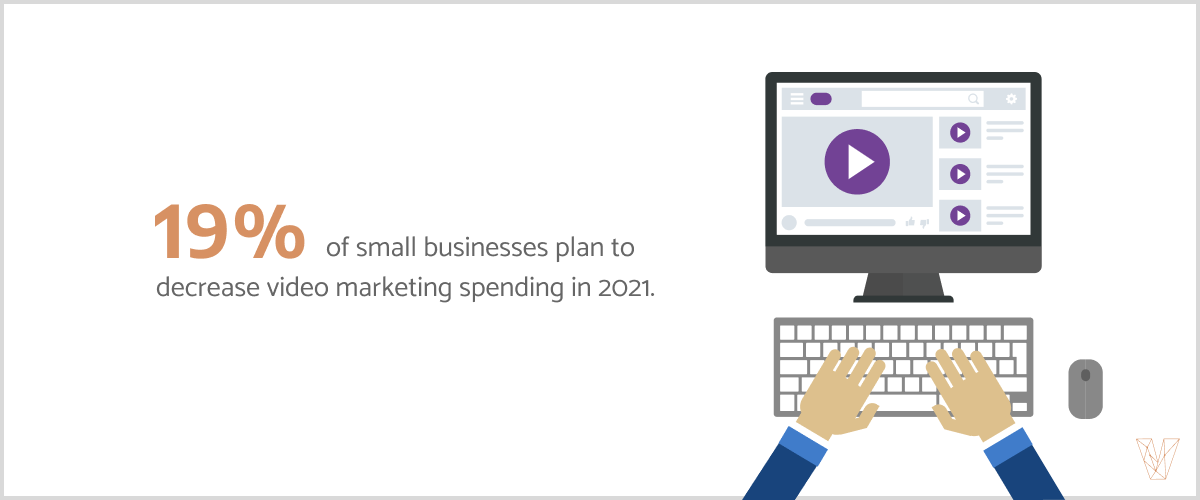
Experts suggest that 3 factors are reducing the amount of money small businesses spend on video marketing:
- Production expenses: Video marketing is fading in popularity among small businesses, likely due to the expenses of production. Hiring an agency to produce and edit a video can cost thousands, a cost small businesses may be unwilling to pay during the economic uncertainties of the pandemic.
- Remote coordination during COVID-19: Bob Bentz, president of digital marketing agency Purplegator, believes that video production projects are less popular and more difficult during COVID. The challenges of shooting creative content while social distancing and abiding by other health-focused requirements may be more trouble than it’s worth for small businesses.
- In-house tech accessibility: Bentz recommends shooting video marketing content in-house when small businesses are concerned about production expenses and coordination issues.
“The best thing about video marketing online is that you don't need a Steven Spielberg production. Just shooting with your smartphone generates acceptable content,” Bentz said.
Research from Wave.video reinforces Bentz’s claim, finding that it’s easier for companies to produce videos on their own due to technological accessibility and advancements. This reduces the time and resources necessary for a video production project.
“The best thing about video marketing online is that you don't need a Steven Spielberg production. Just shooting with your smartphone generates acceptable content.”
Small Businesses Doubt Success of Video
As companies reduced their spend on video marketing, they also found that video marketing wasn’t successful at achieving their goals.
Only 6% of small businesses consider video marketing as their most successful digital marketing tool in 2022.
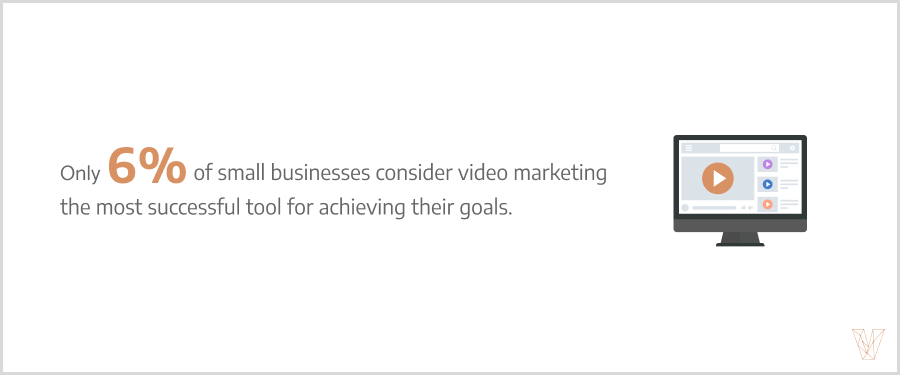
Despite the difficulties of creating video content during a pandemic, digital marketing experts feel video is key to a strong digital marketing strategy. Bentz says it’s the perfect time to invest more in video marketing to distinguish your business, especially if competitors are backing off video due to production challenges.
“It boggles my mind to think why an SMB would reduce video marketing spend in 2021 given that it's much easier to get ranked in a search engine for video,” Bentz said.
In 2022, small businesses should reconsider the benefits of video marketing in their overall strategy.
Videos are a way to engage new customers in an eye-catching way. Small businesses can create videos that are digestible social media content, showcase their products and services, and promote their company’s culture and appearance.
Christian Velitchkov, co-founder of Twiz LLC, a digital marketing agency, believes in the power of video.
“Don’t shy away from using videos as part of your marketing strategy,” Velitchkob said. “A viewer will get more information about your product in less amount of time compared to any other source. People also share video content with friends and family, which helps you increase your reach further.”
Small businesses can continue to conduct video marketing effectively, even if they question its success.
Additional Reading: ‘How to Find & Hire Video Marketing Services’
Most Small Businesses Still Leverage Email Marketing in 2022
People typically spend their weekdays stuck in an inbox. Despite this email fatigue that plagues the workforce, email marketing is still a valuable tool for businesses.
Nearly half of small businesses (48%) still use email marketing as one of their digital marketing tools.
“Email marketing still remains one of the good tools for marketing,” Velitchkov said. “But make sure you don’t annoy your customer.”
Small Businesses Wary of CRM and Email Software
Despite available and accessible technologies, many small businesses conduct email marketing manually.
In 2021, most small businesses that invested in email marketing (64%) executed without a customer relationship management (CRM) or marketing software such as HubSpot or Salesforce.
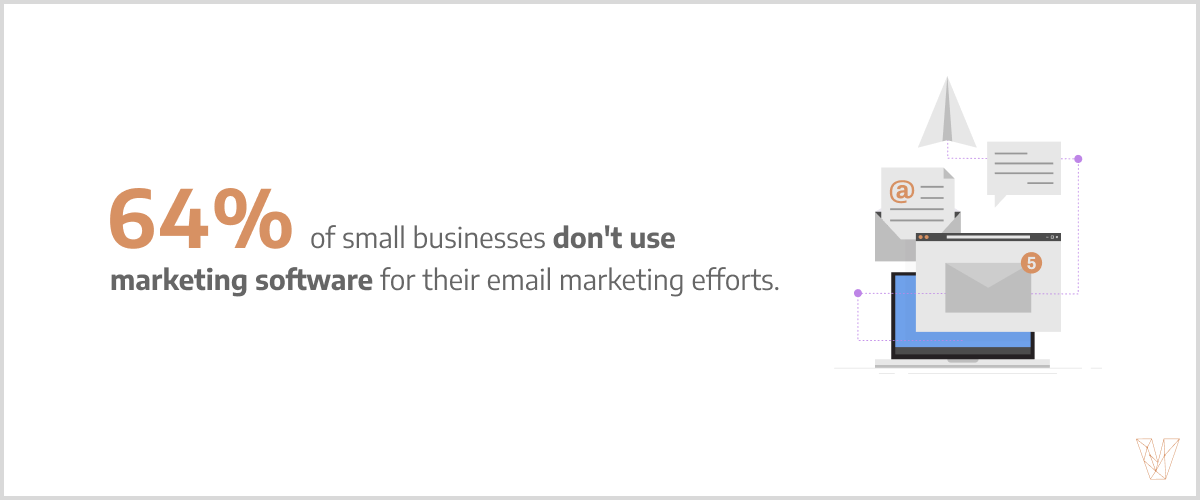
Small businesses might feel that integrating and acclimating to a CRM system requires too many resources. However, digital marketing experts recommend small businesses implement marketing software as soon as possible.
Tina Fleming, brand strategist at digital marketing agency Designzillas, is no exception. She recommends implementing a CRM system and learning about how it can simplify processes.
“Conducting email marketing without a CRM is a mistake, plain and simple. You are leaving money on the table if you're not using a real CRM,” Fleming said.
“You are leaving money on the table if you're not using a real CRM.”
Businesses using CRMs found that they offer the following additional benefits:
- Knowledge of customers
- Enhanced segmentation
- Faster communication
- Improved data protection and privacy
CRMs can automate many processes to benefit businesses. Experts think that small businesses should consider using a CRM to conduct email marketing in the future.
Small Businesses Did Not SEO Spending In 2021
Search engine optimization (SEO) is key to organically rising in the ranks on search results pages, but most small businesses didn’t plan on increasing their SEO investments in 2021.
Only 1 in 10 small businesses (10%) had plans to spend more on SEO in 2021.

Small businesses were not encouraged enough by their current SEO performance to increase related spending in 2021.
Unlike some of the other digital marketing channels, SEO results can take months to materialize and small companies are at an algorithmic disadvantage when competing against larger brands.
Despite SEO’s drawbacks, Jordan Peagler, owner and partner at MKP Law Group LLP, became a proponent of SEO over time. Peagler started leaning on SEO at the start of the COVID-19 pandemic when his group needed new ways to connect with clients.
“We found in 2020 that investing in SEO greatly improved our website traffic and even brought us leads,” said Peagler. “I suggest businesses invest in SEO in some way as it's a great opportunity to earn traffic from potential customers and build lead channels.”
Small businesses may be hesitant to invest more in SEO, but executives attest to its advantages.
Small Businesses Wrestle with Hestitations about Content Marketing and SEO
The hesitation with SEO and content marketing will small businesses continues with future plans for 2022.
Only 6% of small businesses believe that SEO and content marketing are successful at achieving their goals.
While small businesses likely have concerns because of the time it takes for a successful SEO or content marketing strategy to work, this form of digital marketing yeilds proven results
Does SEO Impact Revenue?
Visual Objects data from 2021 found that small businesses that invest in SEO engage digital marketing as a means of supporting revenue generation.
The most direct benefits of SEO are generating traffic and ranking highly in search results pages. These benefits may eventually lead to revenue growth, but SEO is unlikely to boost revenue directly.
SEO is not perfectly suited to generate revenue. Small businesses may be deterred from investing further in SEO if the value-add is not clear.
Matt Bertram, CEO and SEO Strategist at EWR Digital, acknowledges the unique challenges of employing an SEO strategy but ultimately recommends that small businesses maintain SEO practices.
“Small businesses are often disappointed with SEO because it doesn’t give them an immediate boost in sales. This results in them relegating SEO to a low priority,” Bertram said. “Small business owners should enlist the services of an SEO expert to help them refine their SEO strategy and take a slow-and-steady approach that will pay dividends in the long run.”
“Small businesses are often disappointed with SEO because it doesn’t give them an immediate boost in sales. This results in them relegating SEO to a low priority.”
Bertram recommends small businesses aiming to accomplish revenue growth through SEO hire an agency to direct strategy and execution. Then, companies may have a better chance of aligning SEO with their business objectives.
In-House Employees Must Balance Marketing Tasks With Other Responsibilities
While small businesses can afford to invest resources in digital marketing, most in-house employees who assist with digital marketing also have other responsibilities.
These employees must balance their marketing efforts with other work and are unable to give digital marketing their full attention.
In 2020, The Manifest found that companies most commonly rely on in-house employees to handle digital marketing rather than hiring an external freelancer or agency.
Richard Dedor, an executive marketing consultant, has witnessed many small businesses debate the benefits of outsourcing digital marketing work to an agency with specialized experience.
Dedor emphasizes the importance of knowing your brand and staying actively communicating with outsourced partners.
“There will always be a place for a small business to engage an agency, but that only works when the small business is willing to lift their weight,” Dedor said.
“There will always be a place for a small business to engage an agency, but that only works when the small business is willing to lift their weight.”
Additionally, Dedor encourages companies to make sure that a prospective digital marketing agency can deliver. Small businesses will benefit by asking critical questions about the system and strategy an agency proposes.
Small Businesses Will Continue Making Strategic Digital Marketing Decisions
Small businesses will strategically select digital marketing channels and strategies based on their results in 2021 and business objectives in 2022.
Almost all small businesses devote resources to digital marketing efforts. Their digital marketing activity across channels demonstrates the following trends:
- An official social media strategy is the most popular digital marketing solution among small businesses.
- Most small businesses feel that social media, their own company website, and online advertising does the best job of accomplishing business objectives compared to other channels.
- Video marketing is fading in popularity among small businesses, despite the popularity of video content with consumers.
- The majority of small businesses who invest in email marketing don’t use a CRM or marketing software to facilitate but do find it to be an effective digital marketing channel.
- Small businesses hesitate to increase SEO and content marketing spending because of a lack of immediacy.
Small business digital marketing preferences will influence the future of digital marketing.
Ready to take a chance on a top-notch digital marketing team? Take a look at our directory of the best service providers in all facets of digital marketing.
About the Survey
Visual Objects surveyed 1,003 small business owners and managers at companies in the U.S. with fewer than 500 employees in December 2021 about their 2022 digital marketing plans.
Fifty-seven percent (57%) of respondents are male; 43% are female.
Thirty-six percent (36%) are 18 to 34; 53% are 35 to 54; 11% are 55 or over.
Five percent (5%) of respondents’ businesses have one employee; 28% have 2 to 10 employees; 31% have 11 to 50 employees; 24% have 51 to 250 employees; 12% have 251 to 500 employees.
Respondents are from the South (42%), West (21%), Midwest (20%), and Northeast (17%).
Visual Objects surveyed 500 small business owners and managers at companies in the U.S. with fewer than 500 employees in December 2020.
Fifty-three percent (53%) of respondents are female; 47% are male.
Twenty-six percent (26%) are 18 to 34; 50% are 35 to 54; 24% are 55 or over.
Seven percent (7%) of respondents’ businesses have 1 employee; 36% have 2 to 10 employees; 25% have 11 to 50 employees; 18% have 51 to 250 employees; 15% have 251 to 500 employees.
Respondents are from the South (35%), Northeast (23%), West (22%), and Midwest (20%).
